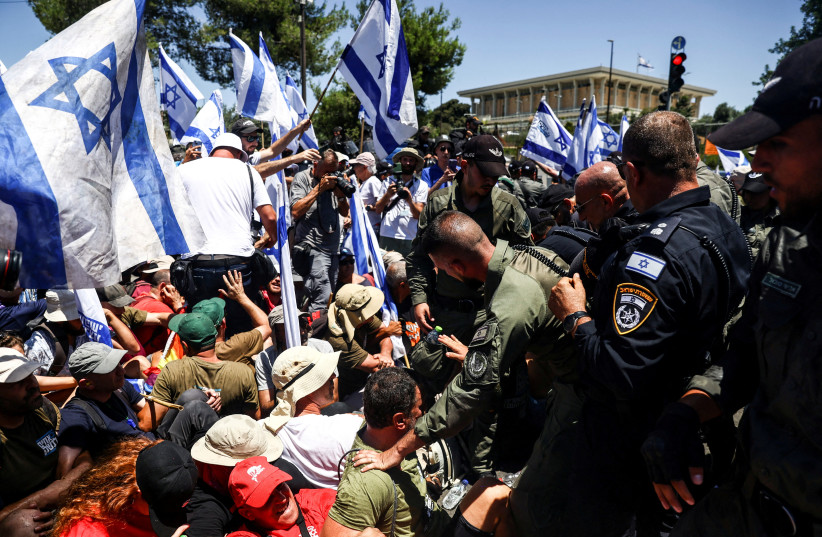Let police do their job – editorial
There is no doubt that the last six months in Israel have been turbulent, and we can assume that the government’s plans for judicial reform will continue to draw opposition, including demonstrations.
The police officers have a challenging job. Public demonstrations lie at the heart of democratic societies, and during the 31 weeks of protests in Israel, hundreds of thousands of people have taken to the streets to express their concerns and demands.
As protectors of law and order, the police play a crucial role in ensuring that these gatherings take place safely. It is the responsibility of the police to balance the protesters’ freedom of assembly and expression along with the need to maintain the public safety and civil liberties of society at large.
It is not an easy task, especially at a time of inflamed passions. Individual officers might not agree with the opinions being so vocally expressed by protesters, yet it is their job to continue to protect them and enable them to have their say. Similarly, some protesters might take a dim view of the police, perhaps mistakenly perceiving them as envoys of National Security Minister Itamar Ben-Gvir.
While most of the weekly protests have been peaceful and nonviolent, Days of Resistance carry with them the potential of escalation. When protesters choose to block highways, and especially when they remove safety barriers to get there and light fires on the roads, they are creating a public danger and it is natural that police should respond.
 Protesters sit on a street during a demonstration against Israeli Prime Minister Benjamin Netanyahu and his nationalist coalition government’s judicial overhaul, near the Knesset, Israel’s parliament in Jerusalem July 24, 2023. (credit: REUTERS/Ronen Zvulun)
Protesters sit on a street during a demonstration against Israeli Prime Minister Benjamin Netanyahu and his nationalist coalition government’s judicial overhaul, near the Knesset, Israel’s parliament in Jerusalem July 24, 2023. (credit: REUTERS/Ronen Zvulun)This needs to be done using a combination of professional judgment and common sense. Civil disobedience, where protesters intentionally violate laws or regulations, requires careful handling. Obviously, the use of force should be a last resort, after nonviolent methods of control, communication, and de-escalation have been employed.
Police have been handling demonstrations successfully
On the whole, the Israel Police has been handling the demonstrations successfully. One only needs to see how riot police in France and elsewhere have been deployed recently to understand that matters can easily descend into violence.
Every complaint of police violence needs to be investigated. The same holds true for every case in which a police officer accuses a member of the public of assault.
We must also take care to ensure that the police is not politicized. The phenomenon of mass refusal by IDF reservists to serve must not repeat itself with the police, where already there are volunteers who have decided to quit.
Former Tel Aviv police commander Ami Eshed resigned last month after an apparent demotion. Subsequently, Eshed launched a blasting criticism of Ben-Gvir.
But senior police officers should take care not to make political speeches while still wearing their uniforms. As with senior military commanders, there needs to be not only an official cooling-off period before senior police personnel can enter politics, but the public also needs to feel that senior police officials are doing their jobs based on professional considerations and not with one eye on their future political prospects.
As the minister responsible for the police, Ben-Gvir cannot be seen to be interfering in the work of the Department of Internal Police Investigations by making statements such as those he made this week, to the effect that complaints about police behavior were “puzzling” and that the police had used “reasonable force.” Ben-Gvir must cease contributing to the politicization; the police officers should answer to the police commissioner, not the minister.
The police force is understaffed, underpaid, and overworked in often challenging or even dangerous conditions. Every effort must be made to improve their conditions, training, and professionalism. The protesters must be able to exercise their democratic right to demonstrate – and the police must be able to carry out its critical role of protecting the public and ensuring public safety.





Comments are closed.